|
|
|
Sort Order |
|
|
|
Items / Page
|
|
|
|
|
|
|
| Srl | Item |
| 1 |
ID:
017157


|
|
|
| 2 |
ID:
151972
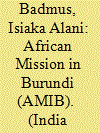

|
|
|
|
|
| Summary/Abstract |
This article examined the African Mission in Burundi (AMIB), assessed its success and drew lessons learned from the experience. The author argued that the mission was successful in restoring peace and stability in Burundi, although the disarmament, demobilisation and reintegration (DDR) component of its mission was not achieved. The willingness of the African Union (AU) to send a peacekeeping mission as a stabilizing force within an ongoing conflict shows that the organization is serious about tackling security issues on the continent. In spite of AU’s endeavours, the article establishes that the AU is being challenged by what is called the ‘triangular area of tension in African peacekeeping (AU’s ambitions versus AU’s peacekeeping capacities versus member states’ political will and agendas). The article concludes with a reflection on lessons learnt from AMIB as a prelude to addressing this area of tension for better future peacekeeping performances in Africa.
|
|
|
|
|
|
|
|
|
|
|
|
|
|
|
|
| 3 |
ID:
162482
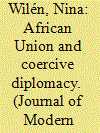

|
|
|
|
|
| Summary/Abstract |
In December 2015, the African Union (AU) took the unprecedented step of threatening to use military force against the government of Burundi's wishes in order to protect civilians caught up in the country's intensifying domestic crisis. This article traces the background to this decision and analyses the effectiveness and credibility of the AU's use of coercive diplomacy as a tool of conflict management. After its usual range of conflict management tools failed to stem the Burundian crisis, the AU Commission and Peace and Security Council tried a new type of military compellence by invoking Article 4(h) of the Union's Constitutive Act. We argue that the threatened intervention never materialised because of (1) the Burundian government's astute diplomacy and (2) several African autocrats’ resistance to setting a precedent for future interventions where concerns about civilian protection might override state sovereignty.
|
|
|
|
|
|
|
|
|
|
|
|
|
|
|
|
| 4 |
ID:
083083
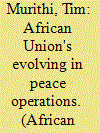

|
|
|
| 5 |
ID:
090141
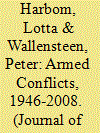

|
|
|
|
|
| Publication |
2009.
|
| Summary/Abstract |
In 2008, the number of active armed conflicts was 36, up by one from 2007. Over the past few years, the number of active conflicts has not seen any drastic changes from one year to the next. However, the number of armed conflicts has increased by nearly one-quarter since 2003, which was the year with the lowest number of active armed conflicts since the 1970s. While the number of conflicts continued to increase, the number of wars (i.e. conflicts with over 1,000 battle-related deaths) remained at a very low level, with only five recorded for 2008. Four conflicts listed in 2007 were no longer active in 2008, but during the year, two conflicts were restarted by previously recorded actors (in Burundi and in Georgia). Furthermore, three new conflicts erupted, one of which was fought between states (Djibouti-Eritrea). Thus, the record-long four-year interlude 2004-07 with no interstate conflict was broken.
|
|
|
|
|
|
|
|
|
|
|
|
|
|
|
|
| 6 |
ID:
186319
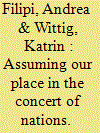

|
|
|
|
|
| Summary/Abstract |
Pierre Nkurunziza died in 2020, just a few months short of completing his tenure as the first post-civil war President of Burundi. Critics have cast him as yet another rebel-turned-politician who came to office on a promise of a democratic transformation but became progressively authoritarian, particularly during his third, disputed term in office. As a political figure, however, Nkurunziza remains poorly understood. What kind of a worldview motivated his politics? Drawing on critical discourse analysis, we identify three recurring themes in Nkurunziza's key political speeches: anti-colonialism; unity and self-sufficiency; and discourse around ‘politics of a new beginning’. These themes were stable across time, indicating Nkurunziza's consistent worldview, but became more pronounced and radical as he faced growing challenges to his legitimacy from within and without. Far from being confined to rhetoric, the themes also manifested in concrete policy decisions, underscoring the urgent need to take ideology seriously in understanding the political trajectories of African leaders.
|
|
|
|
|
|
|
|
|
|
|
|
|
|
|
|
| 7 |
ID:
137972
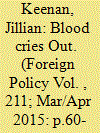

|
|
|
|
|
| Summary/Abstract |
When Pierre Gahungu thinks about the small farm in the Burundian hills where he grew up and started a family, he remembers the soil—rich and red, perfect for growing beans, sweet potatoes, and bananas. He used to bend over and scoop up a handful of the earth just to savor its moist feel. To Gahungu, now in his 70s, the farm was everything: his home, his livelihood, and his hope. After he was gone, he had always believed, the land would sustain his eventual heirs.
|
|
|
|
|
|
|
|
|
|
|
|
|
|
|
|
| 8 |
ID:
068155
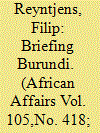

|
|
|
| 9 |
ID:
007880
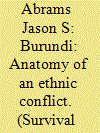

|
|
|
|
|
| Publication |
Spring 1995.
|
| Description |
144-164
|
|
|
|
|
|
|
|
|
|
|
|
|
|
|
|
| 10 |
ID:
089343
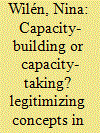

|
|
|
|
|
| Publication |
2009.
|
| Summary/Abstract |
This article critically analyses capacity-building and local ownership in the context of UN peace operations through interviews with UN staff and NGO representatives in Liberia and Burundi. The argument is that these concepts are left ambiguous and undefined to avoid accountability for peace operations while still functioning as value-adding and legitimizing discursive instruments for the latter. This article proves that the many paradoxes and contradictions surrounding the concepts clearly deter their operation in practice, while their positive connotations remain important, discursively, as legitimizing tools.
|
|
|
|
|
|
|
|
|
|
|
|
|
|
|
|
| 11 |
ID:
164034
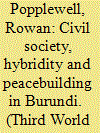

|
|
|
|
|
| Summary/Abstract |
Critics argue that liberal peacebuilding has resulted in the creation of a civil society populated with organisations that are artificial and externalised. These associations are contrasted with more locally-based groups that are considered to be more authentic and better able to build a hybrid peace that is emancipatory. At first glance, this characterisation appears to describe civil society in post-war Burundi, but on closer inspection a much more complex and interesting picture is revealed which challenges existing conceptualisations of post-conflict civil society. The paper finds that even associations that are deeply rooted in local communities are composites forged through their encounters with the global. Furthermore, this hybridity is not new. Rather it is the product of decades of prior hybridisation, raising important questions about the authenticity and legitimacy of these organisations and, ultimately, their ability to promote a peace that is transformative.
|
|
|
|
|
|
|
|
|
|
|
|
|
|
|
|
| 12 |
ID:
064366
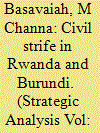

|
|
|
| 13 |
ID:
097771
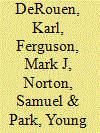

|
|
|
|
|
| Publication |
2010.
|
| Summary/Abstract |
Negotiated civil war terminations differ from their interstate war counterparts in that one side must disarm and cease to exist as a fighting entity. While termination through military victory provides a relatively more enduring peace, many civil wars end with peace agreements signed after negotiations. However, research has shown that the implementation of civil war peace agreements is difficult and prone to collapse. Often these failures are followed by recurrence of the conflict. In some cases, the agreements break down before key provisions are implemented. This article adds to this topic by focusing on the role of state capacity in peace agreement success. We argue that peace agreements and state capacity are necessary but not sufficient conditions for sustainable peace. The article employs a case study approach to explore the importance of state capacity in implementing civil war peace agreements. The role of third-party interventions is also considered. The cases (United Kingdom-Northern Ireland, Indonesia-Aceh, Burundi, Mali, and Somalia) include 14 peace agreements that vary by war type (secessionist or control over government), type of agreement (comprehensive or partial), levels of state capacity (high or low), and peace success (success, partial or failure), and each experienced third-party involvement in the peace process.
|
|
|
|
|
|
|
|
|
|
|
|
|
|
|
|
| 14 |
ID:
133702
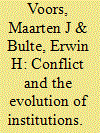

|
|
|
|
|
| Publication |
2014.
|
| Summary/Abstract |
The impact of armed conflict may persist long after the end of war, and may include a lasting institutional legacy. We use a novel dataset from rural Burundi to examine the impact of local exposure to conflict on institutional quality, and try to 'unbundle' institutions by distinguishing between three dimensions of the institutional framework: property rights security, local political institutions, and social capital. We find that conflict exposure affects institutional quality, and document that the impact of conflict on institutional quality may be positive or negative, depending on the institutional measure. Specifically, exposure to violence strengthens in-group social capital and promotes tenure security. However, the appreciation for state institutions is negatively affected by exposure to violence. We find no evidence consistent with design-based theories of institutional quality, or the idea that institutional quality is enhanced by interventions of (non)state external actors. Instead our findings provide some support for the theory of parochial altruism. Our results emphasize the importance for policymakers to consider autonomous responses to conflict when designing development programs. They further imply some caution for actors seeking to reform local institutions through top-down interventions.
|
|
|
|
|
|
|
|
|
|
|
|
|
|
|
|
| 15 |
ID:
158714
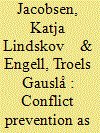

|
|
|
|
|
| Summary/Abstract |
Contemporary conflict prevention depends on information gathering and knowledge production about developments within the borders of a state, whose internal affairs have been deemed precarious by external actors. The international community, especially the United Nations (UN), calls this early warning and early action. However, for governments whose affairs are considered in need of monitoring, preventive endeavours—and the knowledge production they entail—can be seen as ‘early aggression’. In this article, we argue that seeing knowledge production as having power effects reveals contemporary conflict prevention as an interventionary practice. Through an analysis of the international community's preventive diplomacy vis-à-vis Burundi (2015–2016) we highlight three unintended power effects: privileging the UN's knowledge production created resistance to international involvement from the Government of Burundi, it led to a change in patterns of violence and to a backlash against the institutionalization of international monitoring beyond Burundi, and it enabled arguments for further, more forceful, intervention possibilities. This framing enables us to understand the recent return to conflict prevention not as a retreat from liberal interventionism, but as a pragmatic response to its purported crisis. Crucially, although conflict prevention falls short of military intervention, it nonetheless leaves important interventionist footprints.
|
|
|
|
|
|
|
|
|
|
|
|
|
|
|
|
| 16 |
ID:
080702
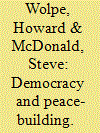

|
|
|
|
|
| Publication |
2008.
|
| Summary/Abstract |
This article, which is a systematic analysis of the practical experiences of the authors in facilitating workshops to help resolve African conflicts, argues that we need to think again about how we both conceptualize and operationalize peace-building techniques. As the Iraq debacle may be said to show, to impose a peace settlement and democratic government institutions on a state and people after a war does not, by itself, work. What is needed is a much deeper understanding by the parties to the conflict that they have shared interests, a common vision and must learn to work in collaboration with one another. In their work in Burundi, the Democratic Republic of Congo and Liberia, the authors and their team have developed new training techniques that are based on experiential learning. They organize workshops that bring key leaders together in a long-term process designed to resolve the tensions and mistrust that are the inevitable by-product of conflict and war, and to build (or rebuild) their capacity to work effectively together across all of the country's lines of ethnic and political division. Through the teaching of concepts such as 'interest-based negotiation' they aim to develop better real communication between the parties and to enhance collaborative capacity that will help build really solid personal and institutional relationships and lasting peace.
|
|
|
|
|
|
|
|
|
|
|
|
|
|
|
|
| 17 |
ID:
140333
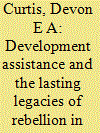

|
|
|
|
|
| Summary/Abstract |
Rwanda and Burundi have both emerged from civil wars over the past 20 years and foreign donors have provided significant contributions to post-conflict reconstruction and development in the two countries. Yet, although Rwanda and Burundi share several important characteristics, their post-conflict social, political and economic trajectories have been different. This article argues that the nature of the ruling parties in Rwanda and Burundi is key to understanding the countries’ relationships with donors. Rather than seeing aid as an exogenous factor, causing particular development outcomes, it shows how local party elites exert considerable agency over the aid relationship. This agency is influenced by a number of different local contextual factors, including how the parties were established, how they evolved and the ways in which their civil wars ended. Thus, the article provides an analysis of how local context matters in understanding donor–recipient aid relationships, and how the ruling party in Rwanda (the RPF) and in Burundi (the CNDD–FDD) emerged from their respective conflicts with different relationships with international donors.
|
|
|
|
|
|
|
|
|
|
|
|
|
|
|
|
| 18 |
ID:
073200
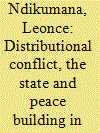

|
|
|
| 19 |
ID:
188998
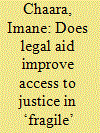

|
|
|
|
|
| Summary/Abstract |
Access to justice is often described as key for building and consolidating peace and enhancing socio-economic development in fragile and post-conflict states. Since the 2000s, legal empowerment has been one of the most popular approaches to improve such access, and a growing literature has presented mixed evidence on the quality of its outcomes. We evaluate and discuss the impact of a locally provisioned legal aid program on justice-seekers’ use of dispute resolution fora, legal agency, and trust in judicial institutions. The program was implemented between 2011 and 2014 in 26 municipalities of rural Burundi. We consider its effects on 486 beneficiaries using various propensity score-matching methods and data on non-beneficiaries from two distinct control groups (n = 3,267). Forty-eight interviews with key informants help discuss judicial practices. We find that the program increased the use of courts but not trust in the judiciary. It had no significant impact on the use of alternative dispute resolution mechanisms. Qualitative and quantitative evidence suggests that justice-seekers’ perception of the treatment they received in courts, also known as procedural justice, shaped their perception of accessing justice. Qualitative evidence also points to a possible ‘watchdog effect’: in some cases, the presence of a legal adviser may have pushed judges to better comply with procedures. While legal aid programs can improve access to courts, it does not necessarily mean an erosion of judicial ‘forum shopping’ or that trust in state institutions is reinforced and rights fully realized.
|
|
|
|
|
|
|
|
|
|
|
|
|
|
|
|
| 20 |
ID:
171563
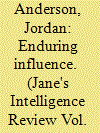

|
|
|
|
|
|
|
|